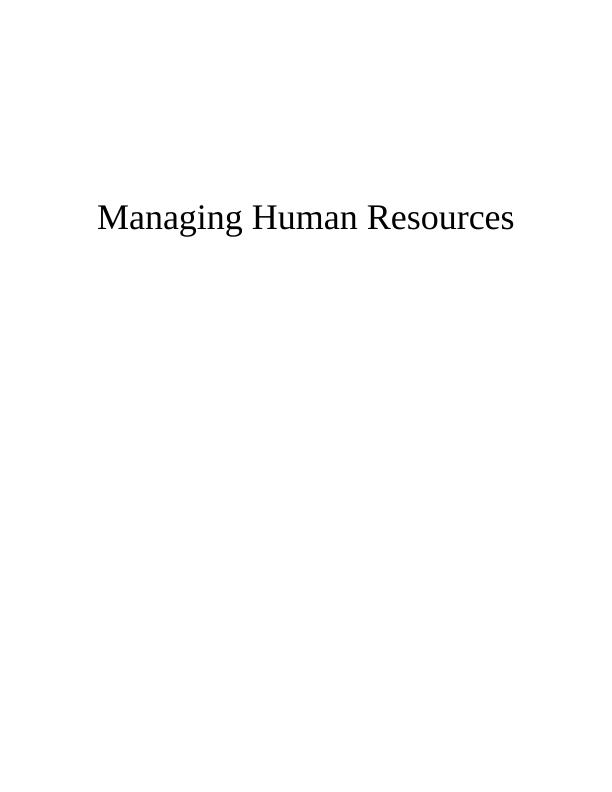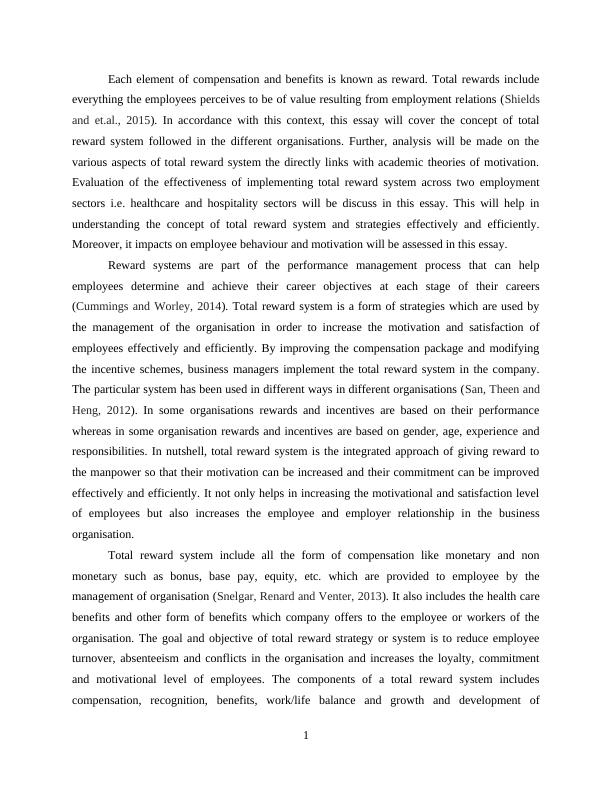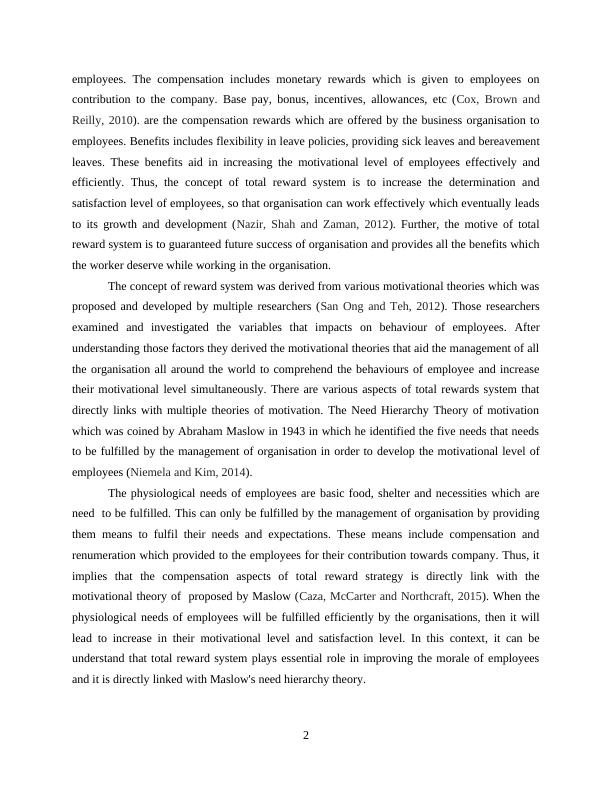Assignment on Managing Human Resources Sample
10 Pages3604 Words26 Views
Added on 2020-07-22
Assignment on Managing Human Resources Sample
Added on 2020-07-22
ShareRelated Documents
Managing Human Resources

Each element of compensation and benefits is known as reward. Total rewards include
everything the employees perceives to be of value resulting from employment relations (Shields
and et.al., 2015). In accordance with this context, this essay will cover the concept of total
reward system followed in the different organisations. Further, analysis will be made on the
various aspects of total reward system the directly links with academic theories of motivation.
Evaluation of the effectiveness of implementing total reward system across two employment
sectors i.e. healthcare and hospitality sectors will be discuss in this essay. This will help in
understanding the concept of total reward system and strategies effectively and efficiently.
Moreover, it impacts on employee behaviour and motivation will be assessed in this essay.
Reward systems are part of the performance management process that can help
employees determine and achieve their career objectives at each stage of their careers
(Cummings and Worley, 2014). Total reward system is a form of strategies which are used by
the management of the organisation in order to increase the motivation and satisfaction of
employees effectively and efficiently. By improving the compensation package and modifying
the incentive schemes, business managers implement the total reward system in the company.
The particular system has been used in different ways in different organisations (San, Theen and
Heng, 2012). In some organisations rewards and incentives are based on their performance
whereas in some organisation rewards and incentives are based on gender, age, experience and
responsibilities. In nutshell, total reward system is the integrated approach of giving reward to
the manpower so that their motivation can be increased and their commitment can be improved
effectively and efficiently. It not only helps in increasing the motivational and satisfaction level
of employees but also increases the employee and employer relationship in the business
organisation.
Total reward system include all the form of compensation like monetary and non
monetary such as bonus, base pay, equity, etc. which are provided to employee by the
management of organisation (Snelgar, Renard and Venter, 2013). It also includes the health care
benefits and other form of benefits which company offers to the employee or workers of the
organisation. The goal and objective of total reward strategy or system is to reduce employee
turnover, absenteeism and conflicts in the organisation and increases the loyalty, commitment
and motivational level of employees. The components of a total reward system includes
compensation, recognition, benefits, work/life balance and growth and development of
1
everything the employees perceives to be of value resulting from employment relations (Shields
and et.al., 2015). In accordance with this context, this essay will cover the concept of total
reward system followed in the different organisations. Further, analysis will be made on the
various aspects of total reward system the directly links with academic theories of motivation.
Evaluation of the effectiveness of implementing total reward system across two employment
sectors i.e. healthcare and hospitality sectors will be discuss in this essay. This will help in
understanding the concept of total reward system and strategies effectively and efficiently.
Moreover, it impacts on employee behaviour and motivation will be assessed in this essay.
Reward systems are part of the performance management process that can help
employees determine and achieve their career objectives at each stage of their careers
(Cummings and Worley, 2014). Total reward system is a form of strategies which are used by
the management of the organisation in order to increase the motivation and satisfaction of
employees effectively and efficiently. By improving the compensation package and modifying
the incentive schemes, business managers implement the total reward system in the company.
The particular system has been used in different ways in different organisations (San, Theen and
Heng, 2012). In some organisations rewards and incentives are based on their performance
whereas in some organisation rewards and incentives are based on gender, age, experience and
responsibilities. In nutshell, total reward system is the integrated approach of giving reward to
the manpower so that their motivation can be increased and their commitment can be improved
effectively and efficiently. It not only helps in increasing the motivational and satisfaction level
of employees but also increases the employee and employer relationship in the business
organisation.
Total reward system include all the form of compensation like monetary and non
monetary such as bonus, base pay, equity, etc. which are provided to employee by the
management of organisation (Snelgar, Renard and Venter, 2013). It also includes the health care
benefits and other form of benefits which company offers to the employee or workers of the
organisation. The goal and objective of total reward strategy or system is to reduce employee
turnover, absenteeism and conflicts in the organisation and increases the loyalty, commitment
and motivational level of employees. The components of a total reward system includes
compensation, recognition, benefits, work/life balance and growth and development of
1

employees. The compensation includes monetary rewards which is given to employees on
contribution to the company. Base pay, bonus, incentives, allowances, etc (Cox, Brown and
Reilly, 2010). are the compensation rewards which are offered by the business organisation to
employees. Benefits includes flexibility in leave policies, providing sick leaves and bereavement
leaves. These benefits aid in increasing the motivational level of employees effectively and
efficiently. Thus, the concept of total reward system is to increase the determination and
satisfaction level of employees, so that organisation can work effectively which eventually leads
to its growth and development (Nazir, Shah and Zaman, 2012). Further, the motive of total
reward system is to guaranteed future success of organisation and provides all the benefits which
the worker deserve while working in the organisation.
The concept of reward system was derived from various motivational theories which was
proposed and developed by multiple researchers (San Ong and Teh, 2012). Those researchers
examined and investigated the variables that impacts on behaviour of employees. After
understanding those factors they derived the motivational theories that aid the management of all
the organisation all around the world to comprehend the behaviours of employee and increase
their motivational level simultaneously. There are various aspects of total rewards system that
directly links with multiple theories of motivation. The Need Hierarchy Theory of motivation
which was coined by Abraham Maslow in 1943 in which he identified the five needs that needs
to be fulfilled by the management of organisation in order to develop the motivational level of
employees (Niemela and Kim, 2014).
The physiological needs of employees are basic food, shelter and necessities which are
need to be fulfilled. This can only be fulfilled by the management of organisation by providing
them means to fulfil their needs and expectations. These means include compensation and
renumeration which provided to the employees for their contribution towards company. Thus, it
implies that the compensation aspects of total reward strategy is directly link with the
motivational theory of proposed by Maslow (Caza, McCarter and Northcraft, 2015). When the
physiological needs of employees will be fulfilled efficiently by the organisations, then it will
lead to increase in their motivational level and satisfaction level. In this context, it can be
understand that total reward system plays essential role in improving the morale of employees
and it is directly linked with Maslow's need hierarchy theory.
2
contribution to the company. Base pay, bonus, incentives, allowances, etc (Cox, Brown and
Reilly, 2010). are the compensation rewards which are offered by the business organisation to
employees. Benefits includes flexibility in leave policies, providing sick leaves and bereavement
leaves. These benefits aid in increasing the motivational level of employees effectively and
efficiently. Thus, the concept of total reward system is to increase the determination and
satisfaction level of employees, so that organisation can work effectively which eventually leads
to its growth and development (Nazir, Shah and Zaman, 2012). Further, the motive of total
reward system is to guaranteed future success of organisation and provides all the benefits which
the worker deserve while working in the organisation.
The concept of reward system was derived from various motivational theories which was
proposed and developed by multiple researchers (San Ong and Teh, 2012). Those researchers
examined and investigated the variables that impacts on behaviour of employees. After
understanding those factors they derived the motivational theories that aid the management of all
the organisation all around the world to comprehend the behaviours of employee and increase
their motivational level simultaneously. There are various aspects of total rewards system that
directly links with multiple theories of motivation. The Need Hierarchy Theory of motivation
which was coined by Abraham Maslow in 1943 in which he identified the five needs that needs
to be fulfilled by the management of organisation in order to develop the motivational level of
employees (Niemela and Kim, 2014).
The physiological needs of employees are basic food, shelter and necessities which are
need to be fulfilled. This can only be fulfilled by the management of organisation by providing
them means to fulfil their needs and expectations. These means include compensation and
renumeration which provided to the employees for their contribution towards company. Thus, it
implies that the compensation aspects of total reward strategy is directly link with the
motivational theory of proposed by Maslow (Caza, McCarter and Northcraft, 2015). When the
physiological needs of employees will be fulfilled efficiently by the organisations, then it will
lead to increase in their motivational level and satisfaction level. In this context, it can be
understand that total reward system plays essential role in improving the morale of employees
and it is directly linked with Maslow's need hierarchy theory.
2

End of preview
Want to access all the pages? Upload your documents or become a member.
Related Documents
MOD003486 Managing Human Resourcelg...
|10
|3731
|228
Motivation and Expectancy Theory in Organizational Behavior and Managementlg...
|8
|1730
|67
HRM Issues Presentation: Total Rewards and Compensationlg...
|13
|759
|372
HRM 898 | Role of Compensationlg...
|7
|1124
|51
Total Reward Compensation .lg...
|4
|736
|233
Managing Human Resources PDFlg...
|15
|4043
|71
